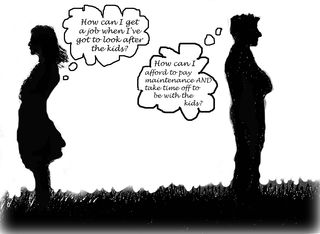Anxiety
Ending a Marriage or Relationship? You Are Not Alone
Ten tips to help tackle the anxiety and sorrow of separation
Posted January 2, 2018

The festive period can be acutely stressful even at the best of times — throw a fracturing relationship into the mix and it’s no surprise that the first Monday back at work in January is the busiest day of the year for divorce lawyers. So if you're considering splitting up with a long-term partner or spouse right now, you are not alone.
Whether you have been quietly consulting friends for recommendations of lawyers or your partner has decided to call time on the relationship, separation is almost inevitably painful and distressing — if children are involved, exponentially more so. It can produce both mental and physical symptoms: anxiety and depression, panic attacks, intrusive thoughts, insomnia, loss of appetite. But don’t despair! Ending your relationship can also be a new beginning and the way to longer-term happiness. I got together with my friend and co-author Pia Pasternack to discuss what we learned from our respective divorces, and we've some suggestions so you can prepare yourself for what lies ahead and smooth the journey for everyone involved.

If you've been together for a long while, it's easy to feel overwhelmed by the cost and administration of such a big life change, but don't despair, you can come through this.
1. Allow yourself your emotions

It is perfectly normal to experience a gamut of reactions to a major life event such as the breakup of a long-term relationship, and normal to worry about an uncertain future. Give yourself a break! Don’t try to bottle things up or deny the grief, anxiety, anger or euphoria you may feel - acknowledge and observe them.
If you can notice your thoughts and feelings, and name them, it helps reduce overwhelm.
2. Don’t feel you have to do it all alone
Just when you are at your most fragile, there seems so much to do, and it’s likely to be bewildering, fraught and daunting. Enlist people to help. Whether to prepare a meal, or take your children to the park for an afternoon, if you give friends specific tasks they will generally be happy to be asked. And when the time comes to visit your lawyer or open divorce-related correspondence, you may feel better if you have someone by your side. Take a leaf from Robert Louis Stevenson, who said: ‘A friend is a present you give yourself.’

3. Break it down
'I remember too well the whirling washing machine worries about my future and how I would cope,' says Pia. 'They were all a big entangled mess.' It’s helpful if you can keep the great big issues at bay by dealing with things one step at a time. If you feel overwhelmed, ask a friend to help pick things apart and make a list of things (maybe even ONE thing) to do today. You can work through it bit by bit. Though possibly important, most of it is not urgent. Remember: a journey of a thousand miles begins with a single step.
4. It’s good to talk
By taking a few people into your confidence, you will have a place to vent and find support. If you feel friends are getting bored, or don’t understand, there are places online where you can let out anguish or confusion and get a sympathetic ear from people who have been there — you might like to join our friendly Making Peace with Divorce group on Facebook. It can be very helpful to see a counselor to talk things through, too. Outsiders will be able to present an alternative viewpoint in case you find yourself in a downward spiral of anxiety or despair, or gently point out if you are being unreasonable. (Be aware, however, that, with the best will in the world, attitudes are likely to be colored by personal experience.) To help to prevent your venting with your ex, in front of the children, or at work, make sure you have a safe space to let off steam or cry. As Stephen Hawking says: mankind’s greatest achievements come about by talking, and its greatest failures by not talking.

5. Remain civil and reasonable
Many experts recommend the ‘No Contact Rule’ after separation. This is good advice to avoid escalating recriminations or a never-ending cycle of painful attachment. However, there will be times, whether because of the divorce process or because you are co-parenting, when some communication is essential. Please, for your own sake and everyone else’s, remain polite and considerate when dealing with your ex. Hard though it can be with someone you once loved, stick strictly to facts. It helps to have a pause before responding to a text or email that has wound you up. Tip: if time permits, and it usually does, sleep on it.
6. Inform yourself
Once lawyers are involved (if you appoint them) or the form filling begins, it can feel as though you have boarded a runaway train and thus increase anxiety and panic. Try to stay on top of the process. There is a lot of information to be had online and in books about divorce. Your rights, the law, which forms you need, sources of help and so on. Indeed you should look into the advantages and disadvantages of employing a lawyer at all, and which type of process will suit your circumstances best (collaborative law, mediation etc). Knowledge is power.

7. If you are a parent, put your children first
Divorce can be traumatic for children. Though you may feel hurt or bitter, try to protect the children (if any) who will be confused and anxious. Their fears can make them volatile or can be suppressed in order not to upset or lose either parent. Reassure them as best you can about your love, and tell them those things that will stay the same as far as they are concerned. The best thing you can do for your children is to continue to give them your attention.
8. Consider counseling or mediation for the two of you
Many people believe relationship counseling is to help couples stay together; in fact a good counselor or mediator can be invaluable in helping you to separate. A trained, impartial third party will allow you both to express yourselves and ensure you both listen to what the other is saying. Ongoing arguments or simmering stalemates can be more easily resolved. This will go a long way to relieving anxiety and stress. Counseling or mediation not only helps with communications during the divorce process, it can make things a lot easier for you in the long term.
9. Look after yourself
At times of stress, the very things that might help, such as exercise, eating well, spending time in nature and socializing may seem too much of an effort. If you can, keep them up, or even try something unfamiliar, like a new sport. Maybe team up with a buddy who can chivvy you along and suggest going for a walk together or trip to the cinema. These things are not only good for you in themselves, but they will also help to distract you from your woes. If not you, who? If not now, when?

10. Try to focus on the positive
We know you may well be thinking — especially if the separation was not your idea — that there are no positives and your situation is unremittingly bleak and hopeless. That’s what Pia thought when her ex walked out. Yet we can assure you that, even if you fought to save your marriage and are heartbroken, you will get through it and things will be better. The truth is, if one of you wants out of a relationship, it is not a good one and you are better off without it, no matter how much the idea pains you now. If you can enjoy the sun on your face, a healthy meal, a hot bath, a laugh with a friend, that’s a good start. The rest will follow. In the meantime, bear in mind that where there is life there is hope, and remember to breathe!
You can do it, and you will get through it! We wish you all the best for the New Year and beyond.





